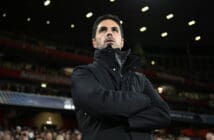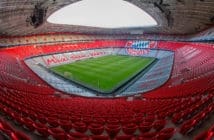Quite simply, Ibrahima Diallo was the itch Arsenal just couldn’t seem to scratch.
It may seem rather melodramatic but given his besieging display within the 90 minutes, it wouldn’t have been out of the question if Arsenal’s dishevelled victims only felt they had received sufficient respite once their aching feet had traipsed back to the coach, ready for a predictably solemn journey back to North London.
Saturday’s unfiltered sunshine unfurled itself onto St Mary’s. After a plethora of night matches, the stadium was bathed in its natural beauty, soaked in glorious sunlight. This of course, meant some sections of the turf were cast in deep, protracted shadow, encompassing areas on the pitch where visibility dimmed.
While Southampton managed to contend with the notable darkness out towards the Kingland stand, Arsenal couldn’t not seem to cope with their one. In a form of a 5ft 8in diminutive silhouette, the visitors remained entangled throughout the afternoon.
It was a silhouette that only swelled in size the closer it got to you. It wasn’t a shadow that was going to be your friend, nor remain idle. Instead, it was steadfast and taut, biting at your ankles and pick-pocketing the football away from you.
In the 23rd minute, Mohammed Elneny fell as the first and ultimately, crucial casualty. Having fastened itself onto Granit Xhaka in the minutes prior, Elneny was now left wondering why the shadow had to be impaled on him. Arsenal had been attempting to play their way out from the back, seeking possible routes in which they could stage a fast transition through the thirds.
Elneny received the ball towards the right hand side of the touchline, a myriad of red shirts and white sashes in plain sight. He thought he had surveyed the scene, examined and understood the advancing landscape; all he had to do was find a way out.
Before he knew it, the ball in the back of his net, his team 1-0 down and left with Hector Bellerin’s piercing glare asking what the hell had just happened.
In case it hadn’t become obvious to you by now, Arsenal’s omnipresent shadow was Ibrahima Diallo. Southampton’s central midfielder had just swarmed Elneny, forcing the Egyptian into an uncomfortable position before seizing upon a faintest moment of vulnerability. His ball win meant Saints regained possession in Arsenal’s final third and presented a potent opportunity for his side to attack.
The storied tale of Diallo’s nagging performance continued into the second half, when two minutes after the resumption, a duel between him and £72 million pound Nicholas Pepe – who cost more than Saints’ entire squad on the day – epitomised the 21-year-old’s domineering, unshakeable display.
Southampton’s pattern of play on the left flank had broken down and Arsenal were launching a rare counter-attack. Ryan Bertrand’s overlapping run meant he was now out of position and closest centre back Jack Stephens was being kept occupied by Eddie Nketiah.
Pepe had soon seen the vacated space and proceeded to drive into it with full pelt and mean intentions. Diallo not only managed to beat the winger in a foot race (from a standing start may I add) but then ensued in winning the ball and leaving Pepe on his haunches, wondering what the hell just happened. Sounds familiar right, Mohammed Elneny?
The overall passage was just perhaps a mere couple of seconds, and yet it divulged so much. Diallo’s reading of the situation, covering position and then his recognition to respond to the right trigger to press, are all precocious gifts for a 21-year-old to have.
Speed for days! ?
Ibrahima Diallo with some midfield hustle ? pic.twitter.com/qwYCXbJ1gO
— Southampton FC (@SouthamptonFC) January 24, 2021
Every passing minute Diallo was a constant thorn in stifling any sort of Arsenal fluidity. He pressed, harried and appeared to have that pesky tendency for picking up second balls and being in the right place at the right time. On the ball, output was limited compared to other recent performances, but still displayed the cute and cutting intelligence that is beginning to become a bedrock within his game.
His 26 passes suggest a fleeting importance with the ball, but a passing success rate of 88 percent and three vertical dribbles more than underline his rising importance in offering incision to Southampton’s possessional-based game. “I must say he is convincing me more and more when he plays,” Ralph Hasenhuttl said after. “Especially his speed with and against the ball.”
Until his acquisition in October, Diallo had been brought to the club’s attention for possessing all the requisite skills a Hasenhuttl player needs. Unabating energy and a fondness for carrying out an intoxicating counterpress, Diallo was swiftly put on the shortlist to replace Pierre Emile Hojbjerg.
However, the player that has emerged at Southampton isn’t just a Hojbjerg prototype or a carbon-copy of the Dane. In fact, Diallo is beginning to effuse his own qualities and indeed add other facets to the team. There is early indications – albeit in small sample sizes – that Hasenhuttl has found an anthesis to everything else Southampton have got.
Oriol Romeu and James Ward-Prowse both provide a binding durability, punctuated by a battle-hardened approach that enables others around them to thrive. Aside from Ward-Prowse and his penchant for set-pieces and whipped deliveries, neither have assembled a particularly expansive attacking skillset. Both have proven adept at circulating possession and keeping the ball moving, but do not always have the passing or dribbling laceration to wrench teams open.
This is where Ibrahima Diallo comes into the equation. Not only does he possess similar hallmarks to Romeu and Ward-Prowse, albeit not as refined quite yet, but also offers an incisive dribbling threat through the centre of midfield, akin to what Stuart Armstrong produces off the right hand side.
Last February, before the pandemic completely disregarded the norm, director of football Matt Crocker returned to Southampton and was instantly tasked with simplifying and streamlining Southampton’s scouting operations. Irrespective of the groundwork that had already been laid into identifying and monitoring Diallo, Crocker helped restructure and undergo a complete overhaul to the recruitment process.
The essence of the decision was to make the recruitment strategy less opaque and provide accountability to those in charge of finalising transfer deals. What transpired in January 2018 still haunted those within the club years later, after Saints had rushed through a deal to make Guido Carrillo their record signing for £19 million pounds. This was despite some inside the club making it clear they harboured severe reservations over the forward. And of course, that scepticism proved to be well-founded.
Les Reed, who held a similar job to Crocker but with some of the remit having evolved, was quick to point out Carrillo was the striker boss Mauricio Pellegrino wanted. The ad hoc manner to which the deal was completed highlighted the need to establish who actually is responsible for dotting the i’s and crossing the t’s. Streamlining the excess of scouts meant future deals were more straight-forward.
The revamped scouting process begun in the last window and Ibrahima Diallo should be the first to bear the fruits of Crocker’s labour. Theo Walcott was a deal that was presented to Southampton and made sense in the short term while Mohammed Salisu’s is yet to record a minute of first team football.
Diallo’s seamless adaptation into the club and life in the Premier League may just set the precedent for future deals under Crocker, Hasenhuttl and chief executive Martin Semmens. Signed by Brest for €2 million Euros to then be sold for €15 million a year later, Diallo’s incremental development through the country’s leagues meant his potential wasn’t brought to the attention of Europe’s biggest or wealthiest clubs.
A French international at youth level (under 18’s-under 21’s), Diallo represented a low risk, high reward deal for Southampton. If you want to quantify the metrics that captured the interest of the club, then you can compare his midfield output to the numbers taken from Ward-Prowse and Hojbjerg last season – Southampton’s most used midfield two.
Given how Southampton play and Hasenhuttl’s prerequisite of his midfielders to press unrelentingly, this writer has chosen to highlight certain statistics that conform to the brand of football:
- Minutes played
- Passing accuracy
- Successful pressures – Quantified by the number of times the player gained possession within five seconds of applying pressure
- Tackles won
In the season 2019/20, Ibrahima Diallo played 19 matches (1563 minutes), considerably less than Hojbjerg’s (33 games – 2750 minutes) and Ward-Prowse’s (38 games – 3420 minutes).
From a reduced sample size, Diallo had a substantially better passing success rate than the pair, with 86 percent of his passes reaching the intended target. However, Hojbjerg (78 percent) and Ward-Prowse’s (74 percent) relatively lowly passing accuracy can be taken in slight mitigation – last season Hasenhuttl placed more midfield emphasis on playing quick and vertically through thirds, as opposed to Brest’s slower, often safer construction of offensive play.
The Frenchman’s successful pressures were in a similar region to the Southampton duo, with Diallo’s 32.2 percent rate better than Ward-Prowse’s (29.5) but slightly lower than Hojbjerg’s (33.5). Once again, it’s worth bearing in mind the caveat of Ward-Prowse playing significantly more minutes, thereby expecting his defensive metrics to be compromised.
Lastly, onto tackles won. Diallo recorded a success rate of 79 percent, winning 38 of his 48 attempted duels. Through a greater sample size of 90 attempted tackles, Hojbjerg’s effectiveness was markedly less, with a win percentage of 63 percent. James Ward-Prowse was also unable to come close to Diallo’s impressive numbers, with a successful tackling regularity of 59 percent.
Admittedly, data is not the be all or end all, nor should a club’s wealth of analytics necessarily be held in higher regard than the trained footballing eye. Facts, figures and statistics always come with a multitude of caveats and provisos, so it can be worth erring on the side of caution.
But if you so chose to, forget the spreadsheets or the catalogue of statistical information. Just watch the recent matches and Ibrahima Diallo’s recent performances. Right now, he is making a compelling case to remain in this Southampton side in spite of Oriol Romeu’s return or how influential the Spaniard had been prior to injury.
The Arsenal game was indicative of the qualities and the extra facets he can give to this team. He provides an altogether different skillset to Ward-Prowse or Romeu and may just have the midfield incision that is missing in the other two’s armoury.
His economical acquisition should set the paradigm for the club’s recruitment strategy. Diallo was Southampton’s shadow on Saturday. Now he can become Southampton’s scouting vessel in the coming years.
Follow us on Twitter @ProstInt
![Prost International [PINT]](https://prostinternational.com/wp-content/uploads/2021/08/PINTtFontLogoRoboto1536x78.jpg)



